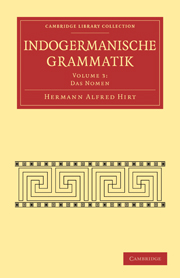Book contents
- Frontmatter
- Vorwort
- Contents
- Einleitung
- I Die Interjektionen
- II Die Partikeln
- III Die Fürwörter. Pronomina
- IV Das Nomen und seine Flexiou
- V Suffix- und Kasusbildung. Die Determinativa
- VI Die Entstehung der Flexion
- VII Die Sufflxbildung. Suffixe aus selbständigen Worten und sonstige Suffixe
- VIII Suffixe durch falsche Abstraktion
- IX Die Wurzeldeterminativa
- X Die Adjektiva
- XI Die Steigerung
- XII Die Adverbia
- XII Die Zahlwörter
- XIV Das grammatische Geschlecht
- Autorenverzeichnis
- Sachverzeichnis
- Wörterverzeichnis
- Berichtigungen
XI - Die Steigerung
Published online by Cambridge University Press: 29 August 2010
- Frontmatter
- Vorwort
- Contents
- Einleitung
- I Die Interjektionen
- II Die Partikeln
- III Die Fürwörter. Pronomina
- IV Das Nomen und seine Flexiou
- V Suffix- und Kasusbildung. Die Determinativa
- VI Die Entstehung der Flexion
- VII Die Sufflxbildung. Suffixe aus selbständigen Worten und sonstige Suffixe
- VIII Suffixe durch falsche Abstraktion
- IX Die Wurzeldeterminativa
- X Die Adjektiva
- XI Die Steigerung
- XII Die Adverbia
- XII Die Zahlwörter
- XIV Das grammatische Geschlecht
- Autorenverzeichnis
- Sachverzeichnis
- Wörterverzeichnis
- Berichtigungen
Summary
205. Allgemeines. Die meisten Adjektive können gesteigert werden, d. h. einen sogenannten Komparativ und einen Superlativ bilden. Diese aus dem Altertum überkommenen Ausdrücke geben die Bedeutung der betreffenden Formen nicht in allen Fällen wieder. Neben dem Komparativ besitzt das Keltische z. B. einen Aequalis mit der Bedeutung ‘ebenso groß’ usw. Statt Superlativ, der nach dem gewöhnlichen Gebrauch den höchsten Grad bezeichnet, spricht man auch vom Elativ, einem sehr hohen Grad.
Wenn wir uns auch daran gewöhnt haben, die beiden Formnationen, Komparativ und Superlativ zusammen zu betrachten, so gehören sie doch nicht notwendig zusammen. Zwischen den Bildungselementen von gr. σοϕώτ∈ροζ ‘weiser’ (Komparativ) und σοϕώτατοζ ‘der weiseste’, lit. Komp. didēsnis ‘größer’ und Superl. didsž'áuśas ‘der größte’ besteht ebensowenig ein etymologischer Zusammenhang wie zwischen l. melior ‘besser’ und optimus ‘der beste’. Komparativ und Superlativ sind suffixale Weiterbildungen von Adjektiven, wie sie auch sonst vorkommen und wie wir sie eben behandelt haben. Es ist, glaube ich, möglich, dem Ursprung der Formen näher zu kommen und ihre Entwicklung zu verfolgen.
Literatur: Sommer, Die Komparationssuffixe im Lateinischen IF. 11, 1 ff., 205 ff.; H. Güntert, Zur Geschichte d. griech. Gradationsbildungen, IF. 27, 1; Osthoff, MU. 6, 70ff.; Thurneysen, KZ. 33, 551 ff.
206. Der Komparativ auf -tero. Griechisch und Indisch stimmen darin überein, daß sie zwei Arten von Steigerungsbildung besitzen, nämlich die Arten von gr. ὴδίων, ᾕδιστοζ und σοϕώτ∈ροζ, σοϕώτατοζ.
- Type
- Chapter
- Information
- Indogermanische Grammatik , pp. 287 - 294Publisher: Cambridge University PressPrint publication year: 2009First published in: 1927



